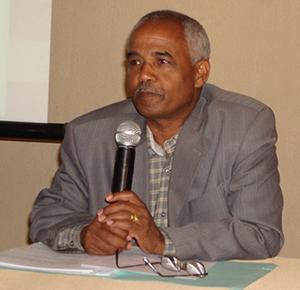There is a chronic gap between the implementation of malaria research and the application of research findings to malaria prevention and control.

Dr. Brook Lemma, Chief Academic Officer for Research, Addis Ababa University and Chair of the Malaria Research Network of Ethiopia. Source: Hiwot Teka/PMI
Malaria is a major public health problem in Ethiopia, with 75 percent of the over 80 million inhabitants at risk for malaria epidemics. Although significant progress has been observed in scaling up malaria control interventions over the past few years, limited efforts have been invested in using research results to inform national malaria policy and the implementation of malaria control. Currently, considerable malaria research is being conducted by in-country stakeholders, including the Government of Ethiopia (e.g. the Ethiopian Health and Nutrition Research Institute), non-governmental organizations (e.g. the Carter Center), and academic institutions. Unfortunately, research is poorly coordinated amongst these stakeholders, as well as with the Federal Ministry of Health, and results are often not widely disseminated. There is a chronic gap between the implementation of malaria research and the application of research findings to malaria prevention and control.
To address this problem, Addis Ababa University, in collaboration with PMI/Ethiopia, conducted a malaria research workshop on May 7, 2010, that led to the establishment of the Malaria Research Network of Ethiopia (MRNE). The purpose of MRNE is to improve connections between researchers, health practitioners, policy makers, and organizations that implement malaria control activities. The MRNE conducts biannual meetings to enable members of the network to share malaria research results from different institutions.
The third meeting of the MRNE, conducted at Jimma University on August 25, 2011, brought together 70 participants from universities, health institutions, and non-governmental organizations, as well as the media, for a full day of provocative discussions on selected malaria research reports from Jimma University. The goal of the meeting was to share malaria research results to inform control and prevention activities in the country, and for researchers to understand and address the country’s operational research needs.
Twelve research papers were presented on themes that included: evaluating perceptions of malaria caregivers, assessing different malaria diagnostic tests, and detailed analyses of the effectiveness of mosquito repellants. A question and answer session gave participants the opportunity to ask questions and foster discussion. The event also garnered excellent media coverage with proceedings detailed in the press.
Thanks to the ongoing efforts of the MRNE, Ethiopia is better able to apply findings from malaria research to inform and improve malaria prevention and control.
